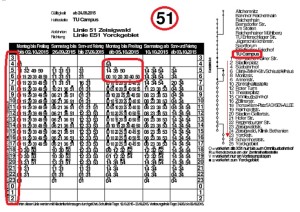So guys, I’m back again and I apologize for the long time I haven’t written anything. I’ve been in France for the last months and there was a sentence I’ve heard so often I have to share it with you: „Oh my god, you’re so German! “. I’ve thought about it for quite a long time and for me, it’s the right time to write it down – what is typical German?
Of course, the first thing I had to ask when someone told me how German I am was a simple „Why? What have I done? “ The most common answer was „How can someone be in time just as … well … always! “ Well, I guess that’s right. We always arrive in time, we’re never late and if were late we call and apologize for it in advance. I’m quite sure there’s no other country where the people arrive in time as often as in Germany.
„Come on guys! It was fun! Why don’t you laugh! You Germans just don’t have any humour“. There was a joke I heard more than once and seriously, I have to admit it’s true: „How many Germans do you need to change a light bulb? One, we are efficient and don’t have humour «. The joke is so mean but true it’s sad and funny at the same time. We are efficient. We are builders and doers and sit down for a few moments and enjoy life and I swear someone will call you lazy and useless. Of course, these characterizations are stereotypical and not all Germans are the same. But come on, Germans, you have to admit that at least a bit I speak the truth. In everything we do we try to do our best and reach perfection – building houses, cooking, cleaning, even doing sports – we have to be the best. Stretch a point? Seldom to never.
The other thing about Germans is our not existing humour. We just don’t laugh as often as other cultures. Sometimes I catch myself giving a lecture after I’ve heard a joke. That’s exactly what I’m doing right now. We hear a joke and … what? We don’t just laugh about it, we talk about it! We discuss about it! We say “Oh no, that’s too harsh, I don’t think that’s true and by the way, it insults someone”.
A last thing I’ve heard quite often was “Why are you always so distant?” Well – why are we? Most of the time, a handshake is all we could handle … a hug between strangers something a lot of Germans would call criminal assault. Okay, that’s a bit harsh but true at the core. Just have a short look at a bus station. Where do you stand? Close to someone else? No, we leave a space of approximately two to three meters to the next person. Someone touches you in the train? Oh – my – god! Why can’t he or she just leave me alone?! Someone’s calling you his friend after two seconds? What’s wrong with him? Okay, just smile and play it cool. By the way another thing I’ve heard from people of other cultures was “You’re not just distant … you’re cold”. Well, are we? Most of the time, we suspect strangers. But give us time. We can be funny and inefficient and warm and we love to hug people and call them friends … after a few moments. I guess that’s the real German thing. We need time to melt and become friends and laugh with them. But when we are, prepare yourself, you’ve found a friend for lifetime!
So for now, my dear followers, what is typical German for you? Write it down in the comments below, I’m really interested in your ideas and stories!

